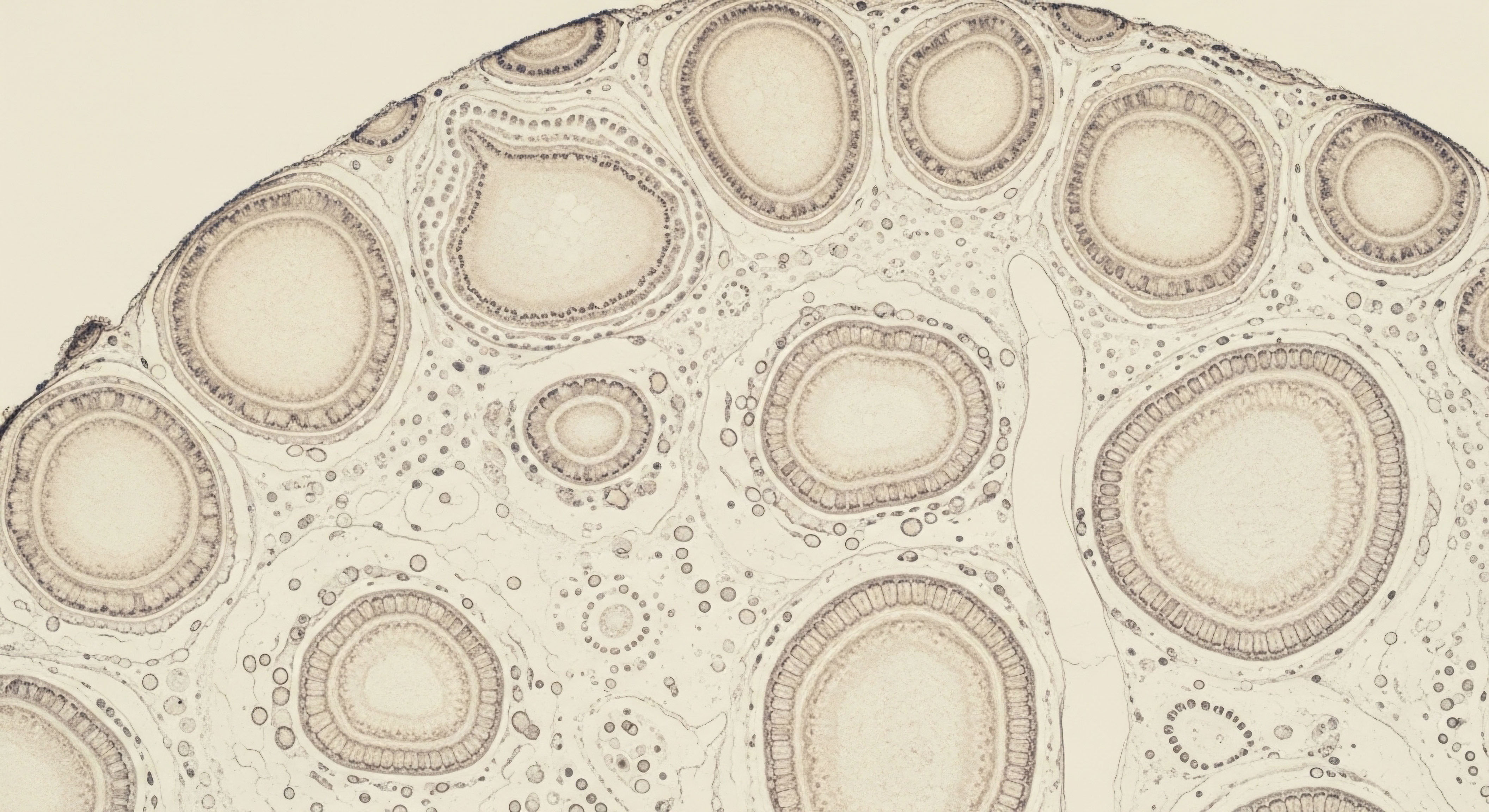

Fundamentals
Have you ever experienced moments where your energy seems to vanish, your mood shifts without a clear reason, or your body composition changes despite consistent efforts? These experiences can feel disorienting, leaving you searching for explanations. Many individuals find themselves grappling with such symptoms, often attributing them to stress or aging.
While these factors certainly play a role, the underlying orchestrators of these changes are frequently your body’s intricate chemical messengers ∞ hormones. Understanding these signals and how they interact with your daily choices offers a path to reclaiming vitality and function.
Your endocrine system, a complex network of glands, produces and releases these hormones, which act as vital communicators throughout your body. They regulate nearly every physiological process, from your sleep-wake cycles and metabolic rate to your reproductive capabilities and emotional responses. When this delicate system falls out of balance, the effects can ripple across your entire well-being, manifesting as the very symptoms you might be experiencing.
Hormones act as the body’s internal messaging service, orchestrating vital physiological processes from metabolism to mood.
Consider the profound impact of your diet on this internal communication system. The foods you consume provide the raw materials for hormone synthesis, influence their transport, and dictate how your body processes and eliminates them. Dietary choices can either support the harmonious operation of your endocrine glands or introduce disruptions that lead to imbalances.
A diet rich in processed items, for instance, can trigger systemic inflammation and insulin resistance, both of which directly interfere with hormonal signaling. Conversely, a thoughtful approach to nutrition can serve as a powerful tool for restoring equilibrium.

The Body’s Chemical Messengers
Hormones are chemical substances secreted by specialized glands into the bloodstream. They travel to target cells or organs, where they elicit specific responses. This system operates through feedback loops, similar to a home thermostat. When a hormone level drops below a set point, the body signals its production. When levels rise sufficiently, production is inhibited. This continuous adjustment maintains a stable internal environment.
For instance, the hypothalamic-pituitary-gonadal (HPG) axis governs reproductive hormones. The hypothalamus releases gonadotropin-releasing hormone (GnRH), which prompts the pituitary gland to secrete luteinizing hormone (LH) and follicle-stimulating hormone (FSH). These, in turn, stimulate the gonads (testes in men, ovaries in women) to produce testosterone, estrogen, and progesterone. Disruptions at any point in this axis can lead to widespread symptoms.

Diet as a Regulatory Mechanism
The relationship between diet and hormonal health is bidirectional. What you eat directly influences hormone production, sensitivity, and metabolism. Conversely, hormonal status can affect your appetite, metabolism, and even food preferences. Recognizing this intricate connection allows for a more precise and effective approach to wellness.
Specific macronutrients and micronutrients play distinct roles. Proteins supply amino acids, which are the building blocks for many hormones, including insulin and growth hormone. Healthy fats are indispensable for the synthesis of steroid hormones like testosterone, estrogen, and cortisol. Carbohydrates influence insulin secretion and blood sugar regulation, which profoundly impacts other hormonal pathways. Vitamins and minerals act as cofactors for enzymatic reactions involved in hormone synthesis and breakdown.
A diet that lacks essential nutrients or contains an excess of inflammatory compounds can strain the endocrine system. This strain can lead to suboptimal hormone production, reduced receptor sensitivity, and impaired detoxification pathways. Addressing these dietary foundations provides a robust starting point for anyone seeking to improve their hormonal well-being.


Intermediate
Moving beyond the foundational understanding of hormones, we can examine specific dietary changes that directly support hormonal balance, particularly in the context of clinical protocols. Dietary interventions are not merely supportive measures; they are active components of a comprehensive strategy to recalibrate endocrine function. The precise interplay between what you consume and your body’s internal chemistry holds significant power.
Consider the impact of dietary choices on insulin sensitivity, a cornerstone of metabolic health that directly influences sex hormones. When cells become resistant to insulin, the pancreas produces more of it, leading to hyperinsulinemia. This state can disrupt ovarian function in women, contributing to conditions like polycystic ovary syndrome (PCOS), and suppress testosterone production in men. Dietary patterns that stabilize blood sugar levels, such as those low in refined carbohydrates and added sugars, can significantly improve insulin sensitivity.
Dietary interventions are active components in recalibrating endocrine function, influencing insulin sensitivity and sex hormone production.

Targeting Macronutrients for Hormonal Support
The balance of macronutrients ∞ proteins, fats, and carbohydrates ∞ is paramount for endocrine health. Each plays a distinct role in hormone synthesis, signaling, and metabolism.
- Proteins ∞ Adequate protein intake provides the amino acids necessary for the synthesis of peptide hormones, such as insulin, glucagon, and growth hormone. Lean protein sources also support satiety and stable blood sugar, indirectly aiding hormonal equilibrium. For individuals undergoing Testosterone Replacement Therapy (TRT), sufficient protein intake is vital for muscle protein synthesis, enhancing the therapeutic benefits of exogenous testosterone. Clinical guidelines often suggest a protein intake of 1.2-1.6 grams per kilogram of body weight for active adults to support muscle maintenance and growth.
- Healthy Fats ∞ Dietary fats are precursors for steroid hormones. Cholesterol, derived from dietary fats, is the foundational molecule for testosterone, estrogen, progesterone, and cortisol. Prioritizing sources of monounsaturated and polyunsaturated fats, such as avocados, olive oil, nuts, seeds, and fatty fish, supports optimal hormone production. Conversely, excessive intake of saturated and trans fats can promote inflammation and interfere with hormone receptor function.
- Complex Carbohydrates ∞ While refined carbohydrates can destabilize blood sugar, complex carbohydrates from whole grains, vegetables, and fruits provide sustained energy and fiber. Fiber is crucial for gut health and the elimination of excess hormones, particularly estrogens. A balanced intake of complex carbohydrates helps maintain stable insulin levels, preventing the cascade of hormonal disruptions associated with insulin resistance.

Micronutrients and Endocrine Function
Vitamins and minerals are not merely supplementary; they are essential cofactors for countless enzymatic reactions involved in hormone synthesis, activation, and detoxification.
Consider the following vital micronutrients:
| Micronutrient | Role in Hormonal Balance | Dietary Sources |
|---|---|---|
| Zinc | Essential for testosterone production and thyroid hormone metabolism. Low zinc levels correlate with reduced testosterone. | Oysters, lean beef, pumpkin seeds, lentils. |
| Vitamin D | Functions as a steroid hormone, influencing testosterone levels, insulin sensitivity, and immune regulation. Deficiency is widespread and linked to various endocrine dysfunctions. | Fatty fish, fortified dairy, sunlight exposure. |
| Magnesium | Involved in over 300 enzymatic reactions, including those related to insulin signaling, cortisol regulation, and thyroid function. Supports muscle repair and sleep quality, both important for hormonal health. | Leafy greens, almonds, dark chocolate, avocados. |
| Selenium | Critical for thyroid hormone synthesis and conversion. Deficiency can impair thyroid function. | Brazil nuts, seafood, eggs, sunflower seeds. |
| B Vitamins | Support adrenal function, neurotransmitter synthesis, and liver detoxification pathways, which are vital for hormone clearance. | Whole grains, lean meats, eggs, leafy greens. |

Dietary Patterns Supporting Specific Protocols
Certain dietary patterns offer a comprehensive approach to supporting hormonal balance, particularly when integrated with clinical interventions like Testosterone Replacement Therapy (TRT) or Growth Hormone Peptide Therapy.

Mediterranean Eating Pattern
The Mediterranean diet, characterized by its emphasis on whole foods, healthy fats, lean proteins, and a rich array of fruits, vegetables, and legumes, consistently demonstrates benefits for metabolic and hormonal health. This eating pattern supports anti-inflammatory processes, improves insulin sensitivity, and aids in the healthy metabolism of sex hormones. For individuals on TRT, this pattern provides the necessary building blocks for muscle growth and recovery while mitigating potential inflammatory responses.

Targeting Estrogen Metabolism
For women, and men managing estrogen levels, specific dietary components can support healthy estrogen metabolism and excretion. The liver plays a central role in detoxifying and eliminating hormones.
- Cruciferous Vegetables ∞ Broccoli, cauliflower, Brussels sprouts, and cabbage contain compounds like indole-3-carbinol (I3C) and diindolylmethane (DIM). These compounds promote the production of beneficial estrogen metabolites (2-hydroxyestrone) over less favorable ones (16-alpha-hydroxyestrone), thereby supporting a healthier estrogen balance.
- Fiber-Rich Foods ∞ Dietary fiber, particularly soluble fiber, binds to excess estrogens in the digestive tract, facilitating their excretion and preventing reabsorption. This mechanism helps maintain optimal circulating estrogen levels. Sources include flax seeds, chia seeds, oats, and a variety of fruits and vegetables.
- Phytoestrogens ∞ Found in foods like flax seeds, soy, and legumes, phytoestrogens are plant compounds that can weakly bind to estrogen receptors. They may exert a balancing effect, either mimicking estrogen when levels are low or blocking stronger estrogens when levels are high.
Integrating these dietary strategies with clinical protocols provides a synergistic effect. Diet provides the physiological foundation, allowing prescribed therapies to function with greater efficacy and fewer side effects. This personalized approach recognizes that true wellness arises from addressing the body’s systems comprehensively.


Academic
A deeper examination of dietary changes supporting hormonal balance requires a rigorous exploration of the underlying endocrinology and systems biology. The human body operates as an interconnected network, where dietary inputs can trigger cascades of biochemical events, influencing hormonal axes, metabolic pathways, and even neurotransmitter function. This section will dissect these complex interactions, grounding our understanding in clinical research and physiological mechanisms.
The intricate dance between nutrition and the endocrine system extends beyond simple nutrient provision. It involves gene expression, enzyme activity, and receptor sensitivity, all of which can be modulated by specific dietary components. Understanding these mechanisms allows for a more precise and evidence-based approach to dietary interventions for hormonal health.
Dietary inputs trigger biochemical cascades, influencing hormonal axes, metabolic pathways, and neurotransmitter function.

The Gut Microbiome and Hormonal Crosstalk
One of the most compelling areas of research connecting diet and hormones is the role of the gut microbiome. The trillions of microorganisms residing in the gastrointestinal tract exert a profound influence on systemic physiology, including endocrine regulation. This interaction, often termed the gut-hormone axis, is mediated through several mechanisms:
- Short-Chain Fatty Acid (SCFA) Production ∞ Dietary fibers, fermented by gut bacteria, produce SCFAs like butyrate, propionate, and acetate. These SCFAs influence enteroendocrine cells (EECs) in the gut, which secrete hormones such as glucagon-like peptide-1 (GLP-1) and peptide YY (PYY). GLP-1 and PYY regulate appetite, insulin secretion, and glucose homeostasis, thereby indirectly impacting other hormonal systems.
- Estrobolome Activity ∞ A specific subset of gut bacteria, collectively known as the estrobolome, produces the enzyme beta-glucuronidase. This enzyme deconjugates estrogens that have been metabolized by the liver and destined for excretion, allowing them to be reabsorbed into circulation. An imbalanced estrobolome (dysbiosis) can lead to excessive estrogen reabsorption, contributing to estrogen dominance and related conditions. Dietary fiber and probiotics can modulate the estrobolome, promoting healthy estrogen elimination.
- Androgen Metabolism ∞ The gut microbiota also influences androgen metabolism. Certain bacterial species can modulate testosterone levels through various pathways, including inflammation regulation and nutrient absorption. Dysbiosis and chronic gut inflammation can increase oxidative stress, negatively impacting testosterone synthesis.
- Hypothalamic-Pituitary-Adrenal (HPA) Axis Modulation ∞ The gut microbiome communicates with the HPA axis, which controls the body’s stress response and cortisol secretion. Microbial imbalances can alter cortisol levels, which in turn can suppress gonadotropin secretion, affecting reproductive hormone release.
Dietary strategies to support a healthy gut microbiome include consuming a diverse range of plant-based foods rich in fiber (prebiotics) and incorporating fermented foods (probiotics). This approach can optimize gut barrier integrity, reduce systemic inflammation, and improve hormonal signaling.

Dietary Lipids and Steroidogenesis
The quality and quantity of dietary fats directly influence steroid hormone synthesis. Cholesterol, the precursor for all steroid hormones, is synthesized endogenously but also derived from dietary intake. The availability of specific fatty acids impacts the fluidity and function of cell membranes, including those of steroidogenic cells in the adrenal glands and gonads.
Omega-3 polyunsaturated fatty acids (PUFAs), found in fatty fish, flax seeds, and walnuts, are particularly beneficial. They possess anti-inflammatory properties and can improve insulin sensitivity, both of which are conducive to optimal hormonal function. Conversely, diets high in trans fats and excessive saturated fats can promote inflammation and cellular dysfunction, potentially impairing steroidogenesis and hormone receptor sensitivity. Research indicates that diets with a higher proportion of healthy fats are associated with improved testosterone and estrogen balance.

Insulin Signaling and Hormonal Crosstalk
Insulin, a hormone produced by the pancreas, plays a central role in glucose metabolism. Its dysregulation, often driven by dietary patterns high in refined sugars and processed carbohydrates, has widespread hormonal consequences. Insulin resistance leads to compensatory hyperinsulinemia, which can:
- Increase Androgen Production in Women ∞ Elevated insulin levels stimulate ovarian androgen production, contributing to hyperandrogenism in conditions like PCOS.
- Decrease Sex Hormone Binding Globulin (SHBG) ∞ High insulin levels can reduce the liver’s production of SHBG, a protein that binds to sex hormones (testosterone and estrogen) in the bloodstream. Lower SHBG means more free, biologically active hormones, which can be problematic if overall levels are high or if the balance is skewed.
- Impair Gonadal Function in Men ∞ Chronic hyperinsulinemia can directly suppress testicular testosterone production.
Dietary interventions that prioritize low glycemic load foods, such as non-starchy vegetables, lean proteins, and healthy fats, are critical for maintaining insulin sensitivity. This approach not only supports metabolic health but also directly contributes to a more balanced endocrine environment.

Dietary Influence on Thyroid Hormones
The thyroid gland produces hormones (T3 and T4) that regulate metabolism, energy production, and body temperature. Dietary factors significantly influence thyroid function.
| Dietary Factor | Impact on Thyroid | Mechanism |
|---|---|---|
| Iodine | Essential for T3 and T4 synthesis. | Iodine is a structural component of thyroid hormones. |
| Selenium | Required for the enzyme deiodinase, which converts T4 to the active T3. | Selenium-dependent enzymes protect the thyroid from oxidative damage. |
| Zinc | Supports thyroid hormone receptor function and T3 conversion. | Zinc deficiency can impair thyroid hormone action. |
| Goitrogens | Compounds in certain foods (e.g. raw cruciferous vegetables, soy) that can interfere with iodine uptake or thyroid hormone synthesis. | Can be mitigated by cooking or moderate consumption. |
Ensuring adequate intake of iodine, selenium, and zinc is paramount for optimal thyroid function. While goitrogenic foods can be part of a healthy diet, individuals with pre-existing thyroid conditions may need to consume them in moderation or cooked form.

Dietary Considerations for Peptide Therapy
For individuals utilizing Growth Hormone Peptide Therapy (e.g. Sermorelin, Ipamorelin/CJC-1295, MK-677) or other targeted peptides (e.g. PT-141, PDA), dietary support enhances the efficacy of these interventions. Peptides are chains of amino acids, and their optimal function relies on adequate protein intake.
A diet rich in high-quality proteins provides the necessary amino acid building blocks for peptide synthesis and repair. Additionally, micronutrients like zinc and magnesium support the enzymatic processes involved in peptide signaling and cellular repair. Maintaining stable blood sugar levels through balanced carbohydrate intake prevents insulin spikes that can interfere with growth hormone secretion and action. Dietary strategies that reduce inflammation also support tissue repair and recovery, complementing the actions of peptides like Pentadeca Arginate (PDA).
The scientific literature consistently supports the notion that dietary modifications are not merely adjuncts but integral components of any protocol aimed at restoring hormonal balance. From modulating the gut microbiome to influencing steroidogenesis and insulin signaling, nutrition provides a powerful lever for optimizing endocrine health and overall well-being.

References
- Di Renzo, L. Gualtieri, P. & De Lorenzo, A. (2024). Obesity, Dietary Patterns, and Hormonal Balance Modulation ∞ Gender-Specific Impacts. Nutrients, 16(11), 1629.
- Minich, D. M. (2024). The Best Foods to Eat for Supporting Estrogen Metabolism. Deanna Minich, PhD.
- Ramezani, M. & Khodabakhshi, A. (2025). A Review of Dietary Interventions for Polycystic Ovary Syndrome ∞ Identifying the Optimal Approach. Fertility Science and Research.
- Vitiello, A. & Ferrara, F. (2024). Nutritional influences on hormonal homeostasis ∞ Exploring mechanisms and implications. ResearchGate.
- Zietek, T. & Rath, E. (2025). Gut Microbiome Regulation of Gut Hormone Secretion. Endocrinology.

Reflection
As you consider the intricate connections between your diet and your hormonal landscape, reflect on your own experiences. Have you noticed subtle shifts in your energy, sleep, or mood that might point to an underlying imbalance? This exploration of dietary influences on hormonal health is not simply an academic exercise; it is an invitation to engage with your own biological systems with greater awareness.
The knowledge presented here serves as a starting point, a compass guiding you toward a more informed understanding of your body’s needs. Your personal health journey is unique, shaped by your genetics, lifestyle, and individual responses to dietary inputs. True progress often begins with careful observation and a willingness to adapt.

Your Personalized Path
Moving forward, consider how these insights might apply to your daily choices. What small, consistent dietary adjustments could you implement to support your endocrine system? Perhaps it involves prioritizing whole, unprocessed foods, increasing your intake of specific micronutrients, or paying closer attention to your gut health.
Remember, optimizing hormonal balance is a continuous process, not a single destination. It requires patience, persistence, and a willingness to listen to your body’s signals. Partnering with a knowledgeable healthcare professional can provide personalized guidance, helping you navigate the complexities of your unique physiology and tailor strategies that align with your specific goals. Your vitality and function are within reach, awaiting your informed and intentional action.



